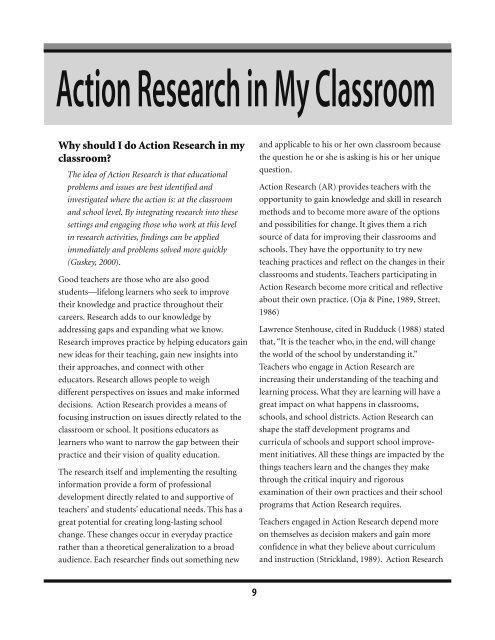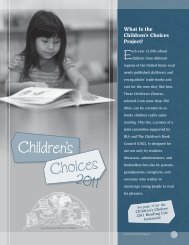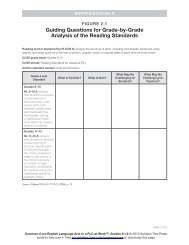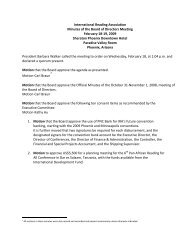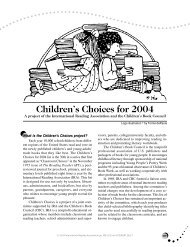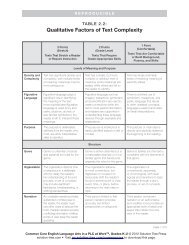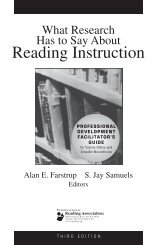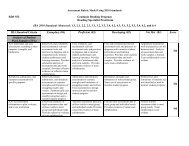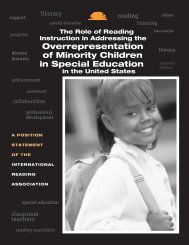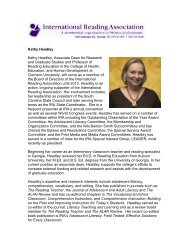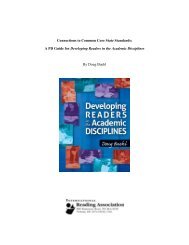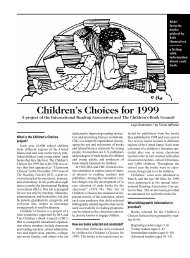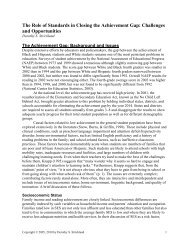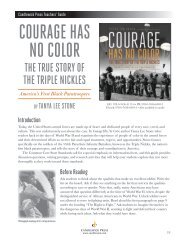A Practical Guide to Action Research for Literacy Educators
A Practical Guide to Action Research for Literacy Educators
A Practical Guide to Action Research for Literacy Educators
Create successful ePaper yourself
Turn your PDF publications into a flip-book with our unique Google optimized e-Paper software.
<strong>Action</strong> <strong>Research</strong> in My Classroom<br />
Why should I do <strong>Action</strong> <strong>Research</strong> in my<br />
classroom?<br />
The idea of <strong>Action</strong> <strong>Research</strong> is that educational<br />
problems and issues are best identified and<br />
investigated where the action is: at the classroom<br />
and school level. By integrating research in<strong>to</strong> these<br />
settings and engaging those who work at this level<br />
in research activities, findings can be applied<br />
immediately and problems solved more quickly<br />
(Guskey, 2000).<br />
Good teachers are those who are also good<br />
students—lifelong learners who seek <strong>to</strong> improve<br />
their knowledge and practice throughout their<br />
careers. <strong>Research</strong> adds <strong>to</strong> our knowledge by<br />
addressing gaps and expanding what we know.<br />
<strong>Research</strong> improves practice by helping educa<strong>to</strong>rs gain<br />
new ideas <strong>for</strong> their teaching, gain new insights in<strong>to</strong><br />
their approaches, and connect with other<br />
educa<strong>to</strong>rs. <strong>Research</strong> allows people <strong>to</strong> weigh<br />
different perspectives on issues and make in<strong>for</strong>med<br />
decisions. <strong>Action</strong> <strong>Research</strong> provides a means of<br />
focusing instruction on issues directly related <strong>to</strong> the<br />
classroom or school. It positions educa<strong>to</strong>rs as<br />
learners who want <strong>to</strong> narrow the gap between their<br />
practice and their vision of quality education.<br />
The research itself and implementing the resulting<br />
in<strong>for</strong>mation provide a <strong>for</strong>m of professional<br />
development directly related <strong>to</strong> and supportive of<br />
teachers’ and students’ educational needs. This has a<br />
great potential <strong>for</strong> creating long-lasting school<br />
change. These changes occur in everyday practice<br />
rather than a theoretical generalization <strong>to</strong> a broad<br />
audience. Each researcher finds out something new<br />
and applicable <strong>to</strong> his or her own classroom because<br />
the question he or she is asking is his or her unique<br />
question.<br />
<strong>Action</strong> <strong>Research</strong> (AR) provides teachers with the<br />
opportunity <strong>to</strong> gain knowledge and skill in research<br />
methods and <strong>to</strong> become more aware of the options<br />
and possibilities <strong>for</strong> change. It gives them a rich<br />
source of data <strong>for</strong> improving their classrooms and<br />
schools. They have the opportunity <strong>to</strong> try new<br />
teaching practices and reflect on the changes in their<br />
classrooms and students. Teachers participating in<br />
<strong>Action</strong> <strong>Research</strong> become more critical and reflective<br />
about their own practice. (Oja & Pine, 1989, Street,<br />
1986)<br />
Lawrence Stenhouse, cited in Rudduck (1988) stated<br />
that, “It is the teacher who, in the end, will change<br />
the world of the school by understanding it.”<br />
Teachers who engage in <strong>Action</strong> <strong>Research</strong> are<br />
increasing their understanding of the teaching and<br />
learning process. What they are learning will have a<br />
great impact on what happens in classrooms,<br />
schools, and school districts. <strong>Action</strong> <strong>Research</strong> can<br />
shape the staff development programs and<br />
curricula of schools and support school improvement<br />
initiatives. All these things are impacted by the<br />
things teachers learn and the changes they make<br />
through the critical inquiry and rigorous<br />
examination of their own practices and their school<br />
programs that <strong>Action</strong> <strong>Research</strong> requires.<br />
Teachers engaged in <strong>Action</strong> <strong>Research</strong> depend more<br />
on themselves as decision makers and gain more<br />
confidence in what they believe about curriculum<br />
and instruction (Strickland, 1989). <strong>Action</strong> <strong>Research</strong><br />
9


